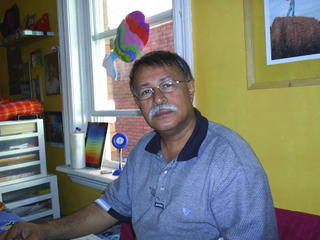The Prisoner's Tale

TIME -- February 10, 2003 / Vol. 161 No. 5
http://www.time.com/time/asia/magazine/article/0,13673,501030210-419422,00.html
The Prisoner's Tale
A journalist recounts his personal story of police abuse and state repression in Bangladesh
BY SALEEM SAMAD/DHAKA
"I should kill you," the high-ranking Dhaka policeman said. He drew his pistol from his holster, shoved me to the floor and pressed the muzzle to my temple. "You are a traitor. You have betrayed your country. How dare you describe the nation as a haven for al-Qaeda and the Taliban?"
My troubles began last November when Britain's Channel 4 asked me to set up interviews and translate for a crew it was sending to Bangladesh to make a documentary on the state of the country. As a long-time reporter in Bangladesh, I was delighted to take the job. But these are perilous times in my homeland. The government holds power with the help of fundamentalist Islamic groups that are changing Bangladesh's secular character; local Hindus and Christians are fleeing to neighboring India in the thousands, and the authorities are furious at media reports that Bangladesh is playing host to jihadis from Afghanistan and beyond. Rather than address these concerns, the government has systematically muzzled journalists and opposition leaders who try to get the story out. Since October, more than 4,000 people have been arrested and 44 have died in custody during a government crackdown supposedly directed at organized crime and euphemistically called Operation Clean Heart.
In this environment, foreign reporters are routinely denied visas to Bangladesh. So Channel 4's crew-British reporter Zaiba Malik and Italian cameraman Bruno Sorrentino-entered as tourists. The authorities were tipped off by a pro-Islamic daily, and we were tailed by police intelligence agents. On Nov. 25, Malik, Sorrentino and Bangladeshi interpreter Priscilla Raj were arrested at the border with India and charged with sedition. I wasn't with them that day. Hearing of their arrest, I decided to lay low. I slept at a friend's home and instructed my 18-year-old son to empty our house of my papers and to hide my hard drive. But the police were tapping my brother's phone, and they heard me tell him where I was. They showed up at my friend's flat at 3 a.m., and I went peacefully. The government charged me with sedition and conspiracy to defame the country.
At the police station, I was held in a 3-meter-by-4.5-meter cell with up to 15 other detainees. The conditions were foul. There was one squat toilet in the floor of the cell and neither soap nor drinking water. We were told to drink from the toilet tank. On the third day I got dysentery. We slept without blankets on the bare concrete floor. The mosquitoes were relentless.
We were given sodden rice and plain dhal to eat. Every few hours I would be woken up and pulled from the cell to answer questions. The same high-ranking officer who brandished his pistol would force me to sit on the floor with my legs extended so he could thrash my left kneecap with his baton. The police wanted a full accounting of the time I spent with the Channel 4 crew: the places we went, the sources we met. I had done nothing to be ashamed of, so I told them everything I knew.
A military intelligence agent present at these interrogations demanded to know where my hard drive was hidden. He threatened to hurt my son and wife. But I would not give up my life's work.
Finally, after five days of interrogation, I was loaded into a police van and driven to a prison in Dhaka, where I was given a cell to myself with a sink and enough blankets to make a mattress. The prison hospital gave me painkillers for the throbbing in my knee. Compared to my treatment at the police station, this was luxurious. Then, after 50 days in custody, I was finally released on bail on Jan. 18, thanks in large part to pressure from Paris-based Reporters Without Borders and New York's Center to Protect Journalists. But the police have yet to return my passport, credit cards, ATM card, mobile phone or address book. And I must still go before the courts to face the charges against me, which carry a maximum penalty of life imprisonment. I am confident the High Court will acquit me of all charges.
The Channel 4 crew was deported back to Britain before Christmas without suffering physical abuse. But Raj has told me that her interrogators tortured her with electric shocks. Before the arrests, however, the Channel 4 team got 80% of their film footage out of the country. The documentary has yet to be broadcast, but if the world is able to see-and read-how Bangladesh is being transformed into a repressive nation, then the suffering and anxiety I and my family have endured will be worthwhile. But for now, I feel I have emerged from a small jail only to enter another, much larger prison.
--

<< Home